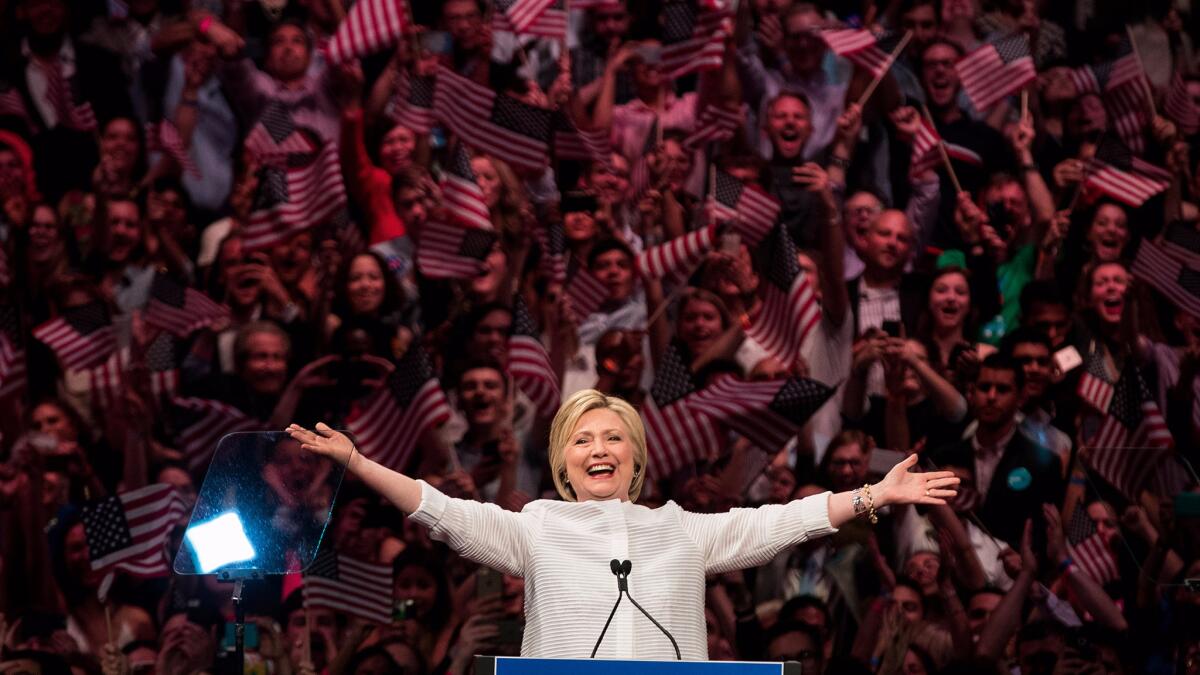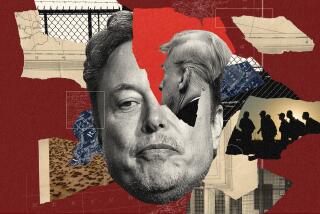Analysis:: Hillary Clinton up, Donald Trump down after a week that flipped the presidential campaign
- Share via
The trajectory the presidential contest took over the last week could be seen from the tone and content of the speeches that Donald Trump and Hillary Clinton gave Tuesday night — to Trump’s detriment.
Trump insisted that his party’s voters could trust him to not let them down: He had to offer that reassurance after the division he sowed by his repeated race-based attacks on the judge hearing a case brought against him by former students at the now-dormant Trump University.
Trump delivered lengthy criticisms of Clinton and her husband Bill’s dealings, red meat to conservatives animated by disdain for the duo, but issues that do not appear top of mind for many voters.
And he repeatedly used the term “America First” to define his domestic and international priorities — a term that duplicates the name of an isolationist and in some cases anti-Semitic group active before World War II.
Clinton heralded her unofficial standing as the first woman to be the nominee of a major political party, describing that victory as part of a continuum of achievements for the country that she said were under threat from Trump.
She placed herself and her loyalists on turf defined by values that could also be occupied by supporters of Bernie Sanders, her Democratic rival, and Republican candidates defeated by Trump.
She signaled a campaign theme of inclusion and acceptance that seemed in direct opposition to the tone set by the presumptive Republican nominee.
The twin speeches represented a remarkable shift.

A mashup of Hillary Clinton’s, Bernie Sanders’ and Donald Trump’s speeches.
Only recently Trump appeared to be consolidating support in his party far faster than the brawling early primary season would have suggested. After his last opponent, Texas Sen. Ted Cruz, dropped out in early May, Republicans who had been critical of Trump began moving en masse to back him.
At the same time, Clinton was having a hard time tamping down the challenge posed by the Vermont senator.
This week, their circumstances reversed.
Trump has wasted time that might have been spent building new relationships with Republicans, including donors, and reaching out to the economically disenfranchised who are a key target in the fall.
He campaigned in California and other heavily Democratic states instead of laying the groundwork for a siege of November’s likely contested states. And worse than that, he has alienated old and new allies.
House Speaker Paul Ryan had barely endorsed Trump before he was in front of cameras decrying Trump’s attacks on federal Judge Gonzalo Curiel, an Indiana-born jurist Trump described as Mexican because of his ancestry.
TRAIL GUIDE: All the latest news on the 2016 presidential campaign »
On Tuesday, Illinois Sen. Mark Kirk, one of a group of Republicans facing tough reelection fights in November, said he would not support the New York businessman as nominee. Kirk said Trump does not possess the temperament of a president.
That is why much of Trump’s nationally televised speech was aimed at shoring up his standing among fellow Republicans rather than expanding his reach to the voters he will need if he is to defeat Clinton in November.
Much of his pitch was a restated version of his typical speech, with the controversial asides and insults stripped out. That had the odd effect of making Trump seem captive to a master other than himself.
He used a TelePrompter, uncomfortably so. In a glaring change, he did not mention the wall he has vowed to construct on the Mexican border. Yet the more muted Trump lacked the kind of fire that won him the nomination.
“I understand the responsibility of carrying the mantle and I will never, ever let you down — too much work, too many people, blood, sweat and tears,” he said. “I’m never going to let you down. I will make you proud of your party and our movement, and that’s what it is, is a movement.”
He made a pitch for those who had cast ballots for others — notably, Sanders’ supporters, even using one of the senator’s favorite words when he called the Democratic delegate system “rigged.”
“Why would politicians want to change a system that’s totally rigged in order to keep them in power?” he asked, taking up a Sanders theme.
That would seem to be a profitable angle for Trump to pursue, since it dovetails with much of the anger present in the electorate this year. But he skipped ahead to criticize the Clintons instead.
He said that in a speech “probably Monday of next week…we’re going to be discussing all of the things that have taken place with the Clintons.” He suggested that it would include acts of collusion between Hillary Clinton’s role as secretary of State and the receipt of money by the Clinton family’s foundation.
But people who care about that sort of Clinton history are probably already inclined to vote against her in November. And by using his speech to flog the issue, Trump used time that might have been spent on more promising avenues with voters on the fence.
In the end, he said little to persuade those he has alienated this campaign cycle—women, Latinos, Muslims, for starters—to give him another chance.
See the most-read stories this hour >>
Clinton has not yet dispensed fully with the challenge posed by Sanders, who made that clear Tuesday night when he said he would take his campaign to the Washington D.C. primary next week and on to the convention in Philadelphia in July.
But there were whiffs of conciliation: The senator told his crowd that Clinton had graciously called him earlier that evening, he skipped his usual criticisms of her, and he made a tentative effort to quell the boos that arose at the mention of her name.
He also planned to meet Thursday with President Obama, a meeting that seems part of a process to draw the Democratic Party together for the fall.
And so Clinton’s speech Tuesday was aimed not at her own party—beyond a call to unity with Sanders’ supporters—but at the broader pool of voters who can ensure her victory in November.
“This has been a hard-fought, deeply felt campaign,” she said. “But whether you supported me or Sen. Sanders, or one of the Republicans, we all need to keep working toward a better, fairer, stronger America.”

All of those groups—indeed, all but Trump and his core supporters, she suggested—have a stake in defeating the Republican.
“Our children and grandchildren will look back at this time, and the choices we are about to make, the goals we will strive for, the principles we will live by,” she said. “And we need to make sure that they can be proud of us.”
Clinton’s speech was not nearly as critical of Trump as her foreign policy address last week, which seemed to energize her campaign heading into the California primary. She repeated her criticism of him as “temperamentally unfit” to be president.
But if she leavened her Trump criticism with an optimistic assessment of the country and its possibilities, she also did not mince words.
“We believe that we are stronger together, and the stakes in this election are high, and the choice is clear,” she said.
“When he says ‘Let’s Make America Great Again,’ that is code for ‘Let’s Take America Backwards.’ Back to a time when opportunity and dignity were reserved for some, not all, promising his supporters an economy he cannot re-create.”
When candidates are on the cusp of seizing the nomination, they often are torn between the remaining primary fight and the looming general election. That has been Clinton’s struggle in recent weeks as she attempted to simultaneously dispatch Sanders and take on Trump. Tuesday’s results effectively ended the primary season for her, giving her only one target.
After stumbling on his path to the general election, Trump is now back in that predicament, fighting against Clinton while still trying to shore up Republican support.
That kind of campaign can be draining and distracting. If anyone knows that it is Clinton, who now, to her delight, finds that problem at least in her rear view mirror.
Twitter: @cathleendecker. For more on politics, go to latimes.com/decker and subscribe to the free daily newsletter.
ALSO:
Hillary Clinton wins California and claims nomination; Sanders vows to keep fighting
Donald Trump doesn’t have a racist heart. But it is cramped and frightened
Hillary Clinton had her historic moment, and now she will try to bring Sanders supporters on board
More to Read
Get the L.A. Times Politics newsletter
Deeply reported insights into legislation, politics and policy from Sacramento, Washington and beyond. In your inbox three times per week.
You may occasionally receive promotional content from the Los Angeles Times.











